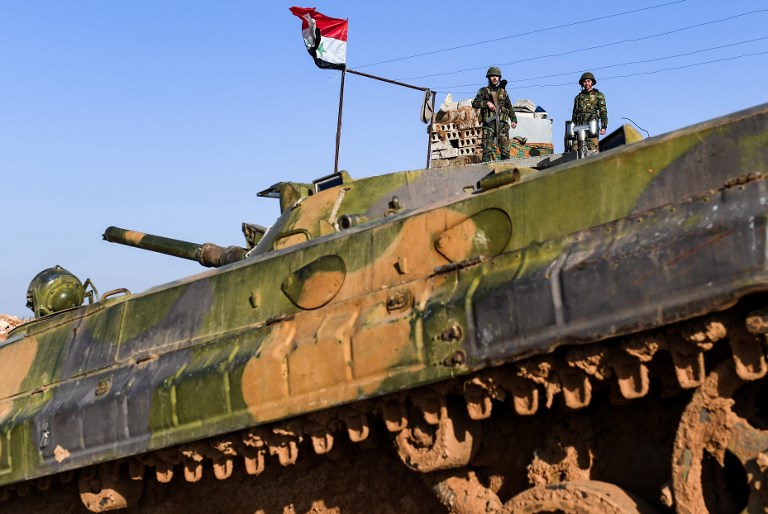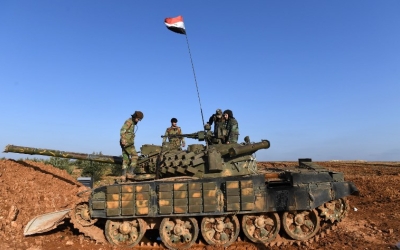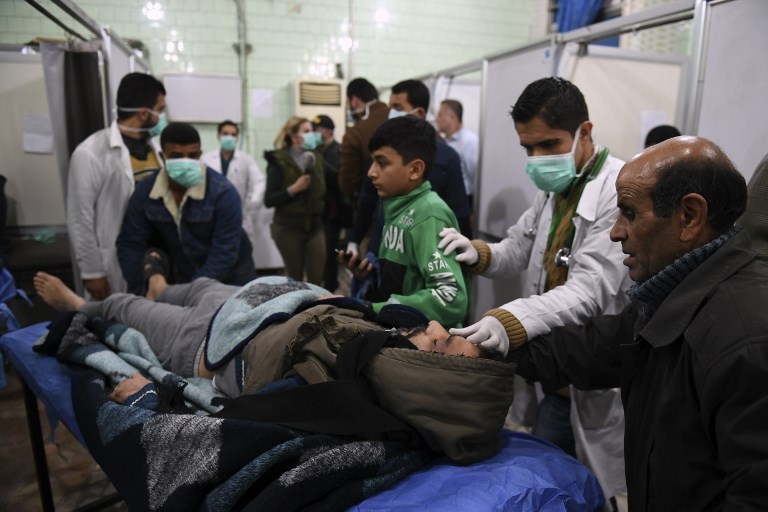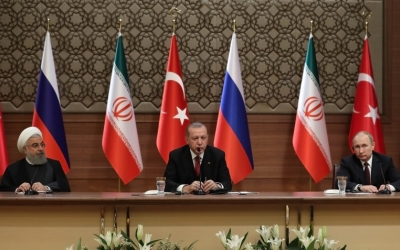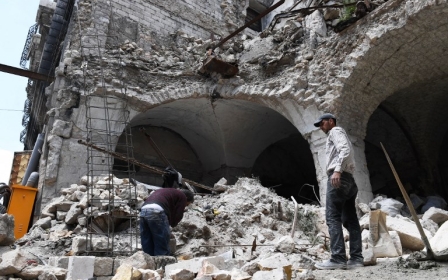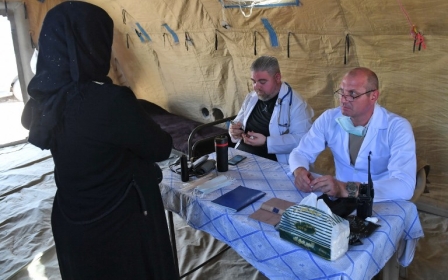Syria war: Rebuilding in the middle of a cyclone
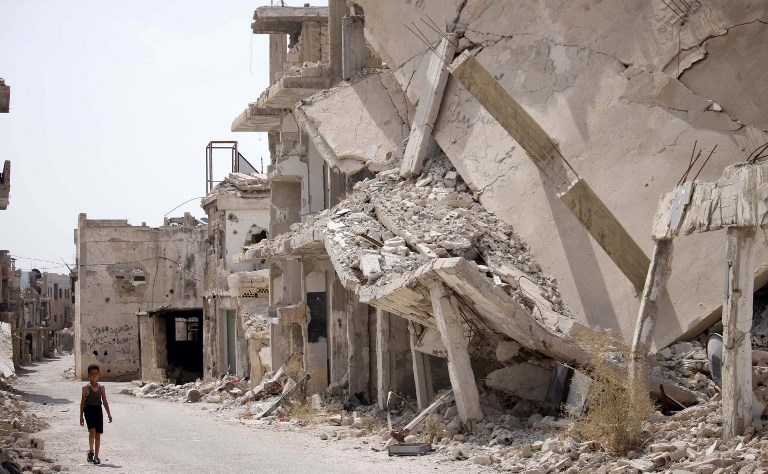
Once upon a time in Syria, there was an evil dictator against whom the people rose up. They were brutally repressed, and war ensued.
This, at least, is one of the versions of the Syrian conflict (2011-present) that is mass-marketed on the international scene, in all of its oversimplified, decontextualised, and politically expedient glory. It's fortunate, then, that antidotes to such deceptive reductionism exist - among them the newly edited collection Syria: From National Independence to Proxy War.
The editors are Linda Matar of the National University of Singapore (NUS) and Ali Kadri of NUS and the London School of Economics, who explain in their introduction - titled "Syria in the Imperialist Cyclone" - that the objective of the compilation is to provide a "broad-scope analysis of what went wrong in Syria" and perspectives from "different angles of the political spectrum".
Significant criticism
Obviously, this is not a book that will go down well with Western cheerleaders for the opposition to Syrian President Bashar al-Assad, who delight in smearing as "Assad apologists" anyone who dares to deflect a bit of blame for the conflict onto any other party.
Stay informed with MEE's newsletters
Sign up to get the latest alerts, insights and analysis, starting with Turkey Unpacked
And while the various contributors to Syria: From National Independence to Proxy War do deliver significant criticism of Assad and his policies, the overarching role of the aforementioned cyclone is made painfully clear.
The Syrian state ... had 'capitulated to the competing interests of comprador-merchants willing to dismantle the country and sell it as scrap metal'
Matar and Kadri write that, after liberating itself from the grip of colonialism in 1946, Syria made impressive advances in literacy, healthcare and other fields, while its socialist policies of land reform and redistribution "righted the wrongs of centuries of inequality and harmonised the pace of economic development for years to come".
But then came the fall of the Soviet Union and the age of neoliberal conquest, when Syria "loosened its socialist dirigisme and opted to enter the world of free markets" - a move that, by late 2010, effectively destroyed the "economic model that had previously ensured the basic needs of society through local capacities and resources". The Syrian state, Matar and Kadri observe, had "capitulated to the competing interests of comprador-merchants willing to dismantle the country and sell it as scrap metal".
Imperialist attack
Neoliberalisation was particularly fierce in 2006-2007 under Assad, who had taken over from his father, Hafez, in 2000 and presided over the removal of price caps on necessities, the withdrawal of subsidies, and other effectively punitive measures. Unsurprisingly, economic turmoil fuelled political turmoil.
But how, you may ask, does any of this constitute an imperialist attack on Syria?
As Matar and Kadri compellingly argue, the Syrians responsible for "letting down the nation's political and economic safeguards" were first and foremost representatives not of the Syrian nation, but rather "bourgeois subordinates" of the "imperialist class, headed by US-led financial capital".
Ideologically, then, they constituted "external forces assaulting Syria" in the interests of US capitalism - which, with the arms industry as one of its pillars, naturally also thrives on more physical forms of assault and destruction.
In her own chapter, "Macroeconomic Framework in Pre-conflict Syria," Matar notes that the Syrian government had acknowledged over the course of the decade preceding the uprising that there were "serious social problems" that needed to be dealt with. However, "it could not escape the Western hegemonic neoliberal agenda that advises developing countries to endorse the mainstream economic conventions" - ie, the promotion of obscene inequality under the guise of development.
Socioeconomic unease
That said, Matar stresses that it was not as though Syria's ruling elites were dragged kicking and screaming into the international financial order; after all, obscene inequality is by definition good for elites. Macroeconomic policies "directed resources to non-productive sectors," while the government curtailed spending on education and healthcare, and poverty and unemployment rates soared.
Reiterating her view that "the national struggle in Syria confronts not only the imperialist-sponsored Islamist reactionaries but also the hegemony of US empire," Matar contends that rebuilding economic strength in Syria requires a departure from the neoliberal doctrine - not the most likely eventuality given that, "because of the Western-imposed economic sanctions, the government has introduced further liberalisation to facilitate various economic and investment activities to the private sector".
In another chapter of the book, Nabil Marzouk - a researcher at the Syrian Centre for Policy Research in Damascus, and a former national strategic planning specialist for the 11th five-year plan in Syria (2011-2015) - offers additional details regarding the deleterious effects of neoliberalism in Syria.
At the prodding of international financial institutions, he writes, the Syrian government set the economy "on a path of de-development," widening the income gap between rich and poor and "exacerbat[ing] socioeconomic unease".
While Marzouk at no point shies away from criticism of the government, he does opine that the "principal blame" for the current violence "lies squarely upon the shoulders of imperialist forces that took opportunity of Syria's weakness to destroy society".
The West’s response
In another chapter, Raymond Hinnebusch - a professor of international relations and Middle East politics at the University of St Andrews in Scotland, and founder of the Centre for Syrian Studies - brings up further historical context crucial to any study of the Syrian crisis: the "Western imperial imposition of the regional states system" after World War I, which "created a set of profoundly flawed states in some ways ‘set up to fail'."
Hinnebusch's survey of "what went wrong" in Syria goes on to address the various more contemporary factors that helped alienate sectors of the Syrian populace from the government. These range from "neglect of the regime's former peasant constituency," to the "penetration of the countryside by Islamist discourse," to the unprecedentedly severe drought of the late 2000s, which overlapped with the government's slashing of rural subsidies.
[Hinnebusch] underscores that the 'Western response to the conflict' was central to its prolongation
Yet, he underscores that the "Western response to the conflict" was central to its prolongation, as the Syrian opposition - conditioned "to expect foreign intervention" - remained committed to sustaining the rebellion and rejected efforts by UN mediators to facilitate a settlement.
The insurgency, Hinnebusch continues, was enabled by all sorts of external machinations, including the "copious flows of arms and financing from the [US-allied] Arab Gulf to support fighters," as well as the "safe haven provided by Turkey which also allowed the transit of foreign fighters and helped organise anti-government forces". An ensuing "counter-intervention by Iran, Hezbollah, and later Russia, blocked an opposition victory, with the result being stalemate up until 2017".
And voila: the "proxy war" of the book’s title.
Healthcare reforms
In light of the war's hundreds of thousands of dead and millions of injured, it's particularly appropriate that Syria: From National Independence to Proxy War devotes considerable attention to the issue of healthcare. In a chapter on the political economy of public health in Syria, social scientist Kasturi Sen - based at Oxford University's Wolfson College - reviews the prewar "commercialisation of the health sector in Syria as manifested by the EU-driven health sector modernisation programme (HSMP) ratified in 2003".
Once a "strong public provider of free health services," Syria was pressured by the European Union and German Development Agency to implement market-friendly "reforms" - because, you know, the right to free healthcare is totally oppressive and barbaric. As was to be expected, privatisation quickly rendered medical care prohibitively costly for many Syrians.
So much for all the Syrians now requiring medical care.
In another incisive chapter, titled "The Political Economy of Thermidor in Syria: National and International Dimensions," Cornell University development sociologist Max Ajl situates Syrian development within the "context of a history in which the global North reigns and is the overwhelming determinant of development outcomes".
For example, he reveals Syria's continuing "diversion of budgetary spending from investment to defence" to be “not merely a phenomenon reducible to a self-explaining 'Praetorian state' but rather ... a Syrian response to global geopolitics and the US special relationship with Israel".
The bigger picture
Ajl further offers a much-needed bigger-picture assessment of the devastating drought - so often reduced to the matter of the Syrian government’s response to the calamity - and demonstrates that it is "only within and against the tableau of global North-induced anthropogenic climate change that we can begin to understand the roots of the Syrian crisis".
After all, as Ajl observes, the carbon dioxide emissions that caused the drought are themselves "global processes rooted in the production patterns of the global North".
So what lies ahead for Syria, following its trajectory from national independence to proxy war?
In their conclusion to the book, Matar and Kadri note that "a state with a modicum of sovereignty is anathema to imperialism" and propose, accordingly, that "to rebuild a strong state is to rebuild the national unity of Syrians".
But it's hard to rebuild a nation in the middle of a cyclone.
The views expressed in this article belong to the author and do not necessarily reflect the editorial policy of Middle East Eye.
Middle East Eye delivers independent and unrivalled coverage and analysis of the Middle East, North Africa and beyond. To learn more about republishing this content and the associated fees, please fill out this form. More about MEE can be found here.



